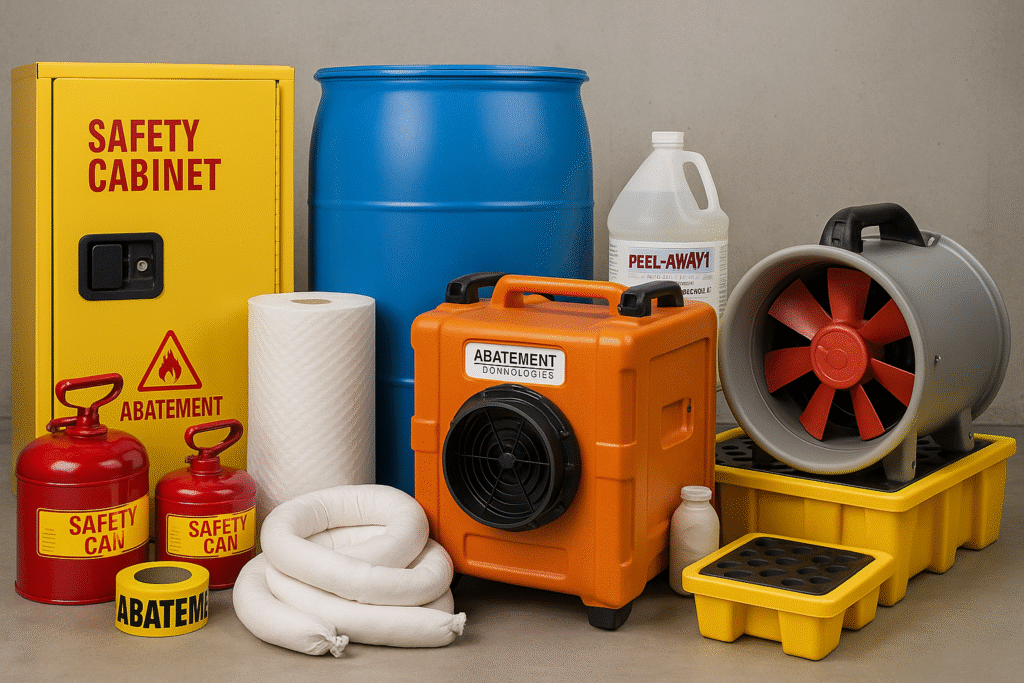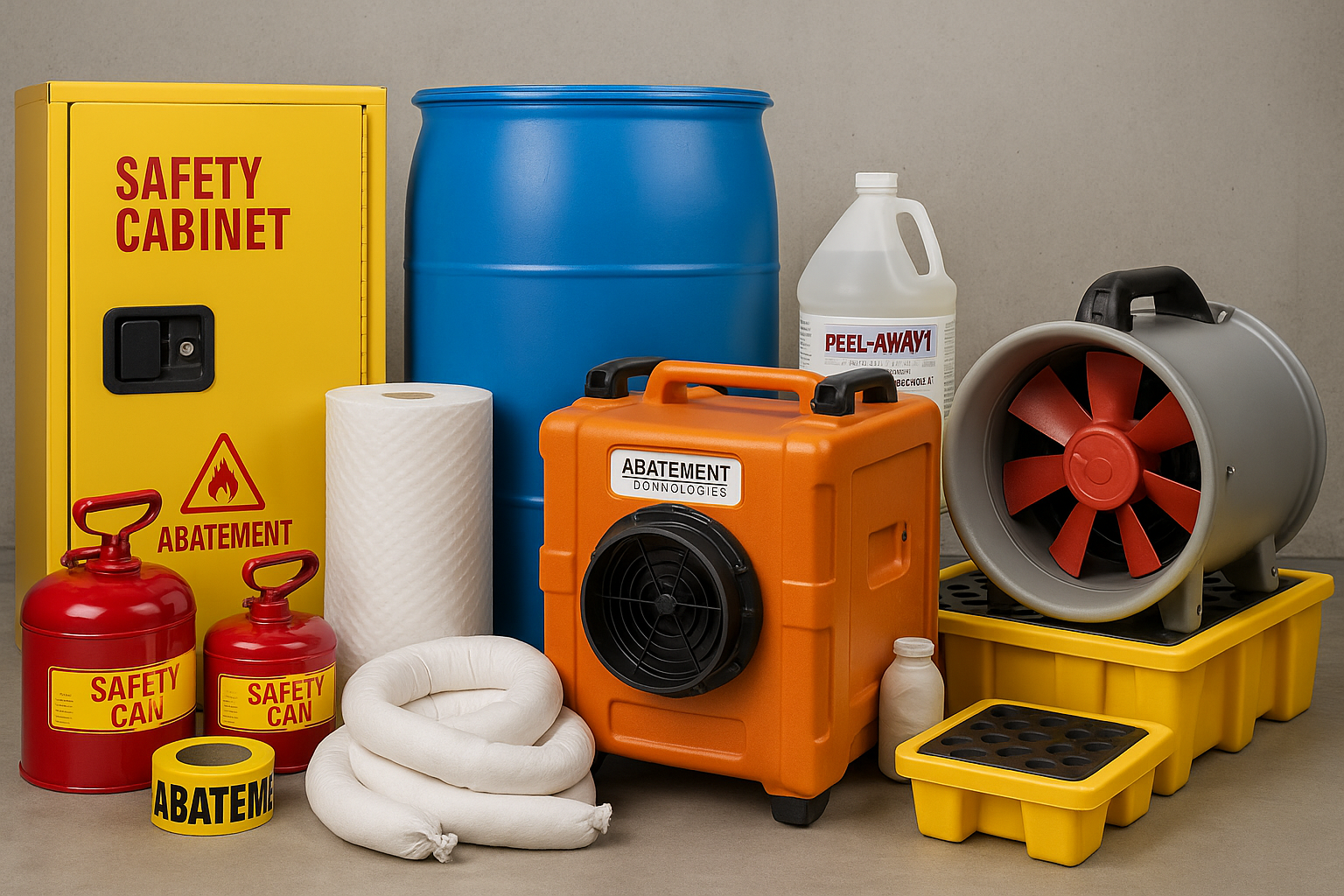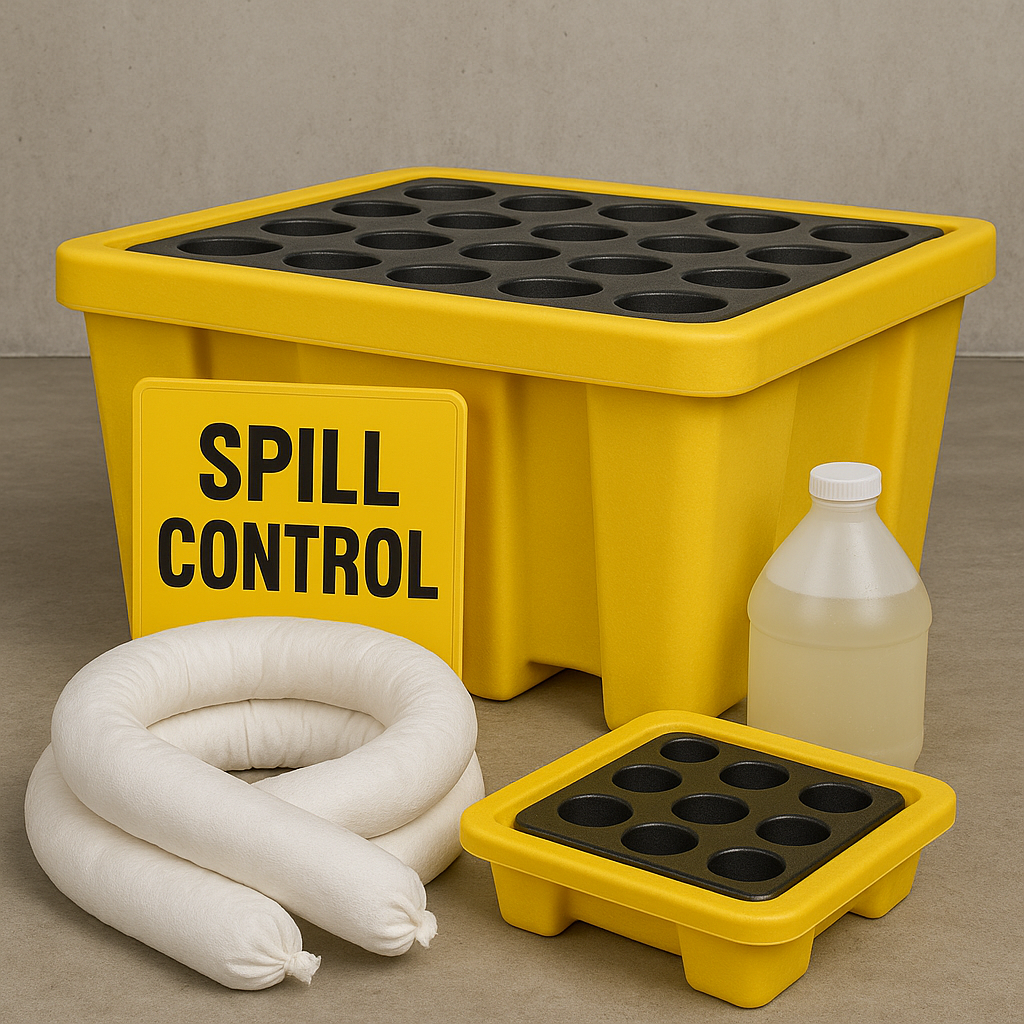Environmental Abatement Accessories are critical in maintaining safe, compliant, and sustainable workplaces.
Whether dealing with hazardous materials, asbestos, mold, or chemical spills, having the right abatement gear and environmental control products on hand helps reduce risks and ensures regulatory compliance.

This article explores the essential categories of abatement products and how each plays a crucial role in protecting workers and the environment.
- Understanding Environmental Abatement and Its Importance
- Environmental Abatement Accessories: Your First Line of Defense
- Abatement Chemicals: Breaking Down Hazards at the Source
- Abatement Equipment: Tools for Safe Execution
- Abatement Poly Items: Containment Made Easy
- Safety Cabinets & Cans: Secure Storage for Hazardous Materials
- Sorbents & Clean-Up: Rapid Response to Spills
- Spill Control & Containment: Preventing Environmental Damage
- Ventilation: Breathing Easy in Hazardous Work Zones
- Building a Safer Workplace with Environmental Abatement Accessories
Understanding Environmental Abatement and Its Importance
Environmental abatement refers to the reduction or removal of hazardous substances from a workplace or site. This may include asbestos, lead, mold, or chemical pollutants.
Failure to manage these risks effectively can lead to serious health issues and costly fines. That’s why employers must use a combination of abatement chemicals, poly sheeting, safety storage, spill containment, and ventilation solutions to create safe work conditions.
Environmental Abatement Accessories: Your First Line of Defense
Environmental abatement accessories include the tools and supplies that support safe cleanup and containment of hazardous materials.
These accessories are not just add-ons—they are essential for maintaining workplace integrity during cleanup and maintenance operations.
Must-Have Environmental Abatement Accessories Include:
- HEPA Vacuums and Filters
For safe removal of particles and dust during asbestos or mold abatement. - Warning Labels and Tape
Ensures clearly marked hazard zones for abatement and containment. - Decontamination Showers and Bags
Protect workers from bringing contaminants home or to other job sites.
Abatement Chemicals: Breaking Down Hazards at the Source
Abatement chemicals are used to neutralize, encapsulate, or safely dissolve hazardous materials like asbestos fibers, lead dust, or mold spores. Common examples include:
- Mold Removers and Inhibitors
Specifically formulated to kill mold spores and prevent regrowth on surfaces. - Asbestos Encapsulants
Used to seal asbestos-containing materials to prevent fiber release. - Lead Dust Cleaners
Break down and remove lead residues safely from surfaces.
Always follow OSHA and EPA guidelines when using abatement chemicals (source).
Abatement Equipment: Tools for Safe Execution
No abatement job is complete without the right tools. Abatement equipment ensures precision, safety, and speed. Essential items include:
- Negative Air Machines
Used to filter and expel contaminated air, reducing the risk of airborne exposure. - Dehumidifiers and Air Scrubbers
Help control moisture levels and remove fine particles during mold remediation. - Containment Units and Waste Disposal Systems
Securely isolate the contaminated area and support safe disposal procedures.

Abatement Poly Items: Containment Made Easy
Polyethylene (poly) items are critical for creating secure work zones during abatement tasks. These include:
- Poly Sheeting
Heavy-duty plastic sheeting to seal off work areas or wrap debris. - Zipper Doors and Flap Systems
Provide safe, sealed access into containment zones. - Poly Tunnels and Glove Bags
Allow workers to safely interact with contaminated materials without full exposure.
Proper poly item installation minimizes contamination spread and improves cleanup efficiency.
Safety Cabinets & Cans: Secure Storage for Hazardous Materials
Flammable liquids, abatement chemicals, and solvents must be stored properly to prevent accidents. Environmental safety cabinets and cans are designed to meet NFPA and OSHA standards (source):
- Safety Cabinets
Fire-resistant storage for flammable liquids, corrosives, and other hazardous substances. - Safety Cans
Provide a portable, leak-proof solution for fuel and chemical storage on job sites.
Having these storage solutions reduces the risk of spills and protects against fire hazards.
Sorbents & Clean-Up: Rapid Response to Spills
Environmental spills can be dangerous and damaging if not addressed immediately. Sorbents are materials that absorb or contain hazardous substances, and they’re a vital component of any spill response plan.
- Oil-Only Sorbents
Designed to soak up oil without absorbing water. - Universal Sorbents
Suitable for oil, water, coolants, and solvents. - HazMat Sorbents
Specifically made for aggressive acids and chemicals.
Cleanup kits should be easily accessible throughout the facility or site to ensure quick and safe responses.
Spill Control & Containment: Preventing Environmental Damage
Preventing a spill is better than cleaning one up. Spill control products help prevent the spread of liquids and reduce the likelihood of environmental damage.
- Spill Berms and Dikes
Create barriers to control the flow of liquids. - Drain Covers and Seals
Protect nearby water systems from contamination. - Secondary Containment Trays
Catch leaks from drums and containers before they hit the floor.
Canadian companies can consult OHSE.ca or local provincial regulations for guidelines on spill containment.

Ventilation: Breathing Easy in Hazardous Work Zones
Effective ventilation is critical in abatement and chemical-handling tasks. It ensures workers have access to fresh air and prevents dangerous build-up of airborne contaminants.
- Exhaust Fans and Ducting
Remove contaminated air and circulate clean air into the workspace. - Air Movers
Enhance air circulation to dry out areas post-abatement or flood cleanup. - Fume Extractors
Used in confined or high-risk areas to pull chemical fumes and particles away from the breathing zone.
Ventilation systems should be selected based on the size of the space, type of contaminants, and local air quality regulations.
Building a Safer Workplace with Environmental Abatement Accessories
Investing in high-quality Environmental Abatement Accessories isn’t just about compliance—it’s about protecting workers, communities, and the planet.

From abatement chemicals to sorbents and ventilation systems, each product plays a vital role in mitigating environmental and occupational hazards. Incorporating spill control, secure storage, and proper cleanup protocols into your operations ensures you’re prepared for both everyday needs and emergency situations.
Explore safety-first solutions and browse trusted brands on Parcil Safety and other industry suppliers for your environmental abatement needs. For Canadian regulations and safety resources, visit OHSE.ca.

No comments yet